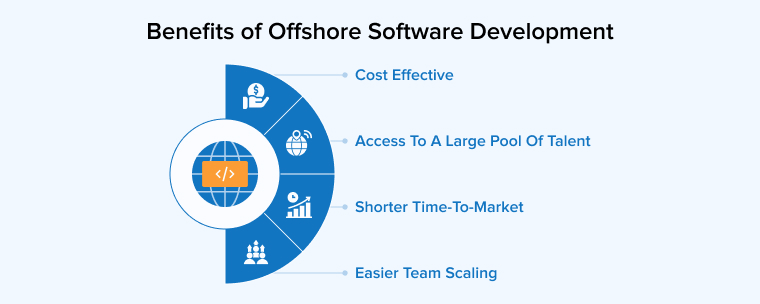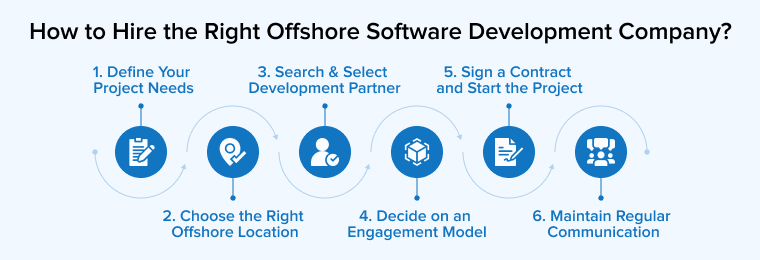
Digitizing paper-based workflows in business using software applications helps improve operational efficiency. However, not every business has the necessary resources or expertise to build suitable software solutions. In such cases, it is logical to outsource the project to a reliable offshore software development company. This approach allows you to tap into the global talent pool and the latest development tools at affordable costs.
Offshore service providers are experts with significant experience. So, they can immediately grasp your requirements, suggest suitable solutions, and deliver results within predetermined timelines.
If you are unfamiliar with how exactly offshore software development works, this guide is for you. Here, we explore the core concept along with its benefits, limitations, and best practices. We also discuss when you should adopt an offshore software development approach, how to find the right offshore service provider, and where to find reliable partners.
1. What is Offshore Software Development?
Offshore software development refers to the practice of hiring external software vendors located outside of your country. In essence, offshore software development is a process where the software product owner delegates a significant portion of the development tasks to a third-party organization overseas. This strategy is often adopted because of the shortage of qualified specialists or a lack of human resources within the home country to meet software development needs. The Offshore Software Development Market size was valued at USD 389.7 billion by 2033, from USD 120 billion in 2023, growing at a CAGR of 12.5% from 2024 to 2033.

1.1 Benefits of Offshore Software Development
When it comes to building software, it is not easy to decide whether to build it in-house or hire an offshore software development company. However, offshore software development offers several benefits that make it an appealing option for many businesses.

1. Cost Effective
Offshore software development offers a major advantage: reduced labor costs. Businesses can access skilled talent at significantly lower rates due to regional differences in the cost of living. This cost-effectiveness does not mean compromising on quality, as many offshore teams maintain high development standards. The substantial savings can be reinvested into essential areas such as marketing, product innovation, or IT infrastructure. This strategic allocation of resources improves operational efficiency and helps companies remain competitive and agile, enabling faster growth and a better return on investment.
2. Access to a Large Pool of Talent
Offshore development provides access to a large pool of knowledgeable and talented software engineers with substantial technical expertise in producing high-quality software applications. Furthermore, many offshore software companies have experience working on international custom software development projects for previous clients, and they understand the issues involved.
3. Shorter Time-To-Market
With a dedicated team for each project, you can be guaranteed that skilled professionals are working around the clock to provide excellent software. This approach not only completes tasks more quickly but also ensures that your software products reach the market sooner. Furthermore, an offshore team can provide new insights that improve your business processes, allowing you to harness innovation and creativity at every stage of the development process.
4. Easier Team Scaling
In any project, different skill sets are needed at various stages— for example, designers and writers early on, and developers and testers later. Traditional hiring makes adjusting to these shifts costly and slow. Offshore development offers a more agile solution. By collaborating with an offshore partner, you gain on-demand access to specialized experts who can join or leave the project as needed. This flexible team structure ensures your project always has the right talent at the right time, without the overhead of permanent hires. It enables efficient resource management and keeps your development process lean, scalable, and cost-effective throughout the project lifecycle.
1.2 Offshore Software Development Risks
There are numerous benefits to adopting an offshore development approach, including cost-effectiveness and delivering high-quality outcomes. However, this approach also presents certain challenges that can affect the success of your software project. You must know about these risks and prepare appropriate measures to overcome them to avoid failure or setbacks.
1. Quality Issues
Ensuring high software quality in offshore development is crucial but challenging due to physical distance and cultural differences between teams. Remote collaboration can lead to communication gaps, misaligned expectations, and difficulties in monitoring progress. These factors increase the risk of inconsistencies or overlooked issues in the final product. To maintain quality, it’s essential to establish clear standards, implement rigorous testing procedures, and foster transparent communication channels.
2. Communication Risk
In offshore projects, clients and vendors often come from different countries or even separate continents. As a result, communication barriers between them may affect the software development process. Although English is the primary language for international communication, cultural differences and local context vary from country to country, impacting the writing and proficiency of the language. If either party overlooks these differences, communication gaps are likely to occur. The time difference between countries also results in inconsistent and delayed communication.
Therefore, offshore and onshore teams must collaborate through emails, messaging apps, and project management software. These tools help track individual tasks, enhance remote cooperation, and work as an effective team to fulfill the project goals.
3. Legal Specifics
When engaging in offshore software application development in a specific country or region, you must comply with various government-imposed limits and laws. That is why you must pay great attention to the contract’s subtleties. Make careful to specify significant points such as compliance with local rules, data protection measures and regulations, intellectual property rights, non-solicitation restrictions, confidentiality obligations, and liability terms.
4. Lack of Control and Oversight
Outsourcing software development can reduce your control over project progress, increasing risks such as delays, poor quality, or deviations from your vision. To mitigate these issues, it’s crucial to partner with a reputable software developer recruitment agency that understands your needs. Maintain consistent communication with the outsourced team through regular updates and progress reviews to ensure alignment and timely issue resolution. Assign a dedicated project manager to serve as the bridge between your internal team and external developers to coordinate efforts, clarify expectations, and keep the project on track.
2. Difference Between Onshore, Nearshore, and Offshore Outsourcing
Let’s explore the differences between offshore, onshore, and nearshore in the software development space.
2.1 Onshore Outsourcing
Onshore outsourcing means that your business and your outsourcing partner are located within the same country or region. This approach helps your business overcome challenges such as language barriers, cultural differences, time zone differences, and several other factors. This is especially beneficial for companies that want to travel less and still leverage the benefits of outsourcing services.
2.2 Nearshore Outsourcing
Nearshore outsourcing means partnering with companies that are located in neighboring countries, often within the same continent. For example, companies in the USA may outsource to Mexico. This serves the purpose of cost-effectiveness, and you have access to global talent, too.
2.3 Offshore Outsourcing
Offshore outsourcing involves hiring third-party companies that are located far away from the actual location. This approach brings challenges such as differences in time zones, culture, language, geographic distance, and other barriers. Despite these barriers, it is quite lucrative when it comes to development cost factors.
3. When Should You Hire an Offshore Software Development Company?
There are many reasons to consider offshore development, but the common question among businesses is How do we know it’s the right time. Well, here are the instances when you would need to hire offshore developers.
3.1 For Reducing Liabilities
Software development is a complex task that involves many factors, such as choosing the right technology, provisioning sufficient server capacity, and managing the database. Therefore, it may cost you much more than you might have imagined due to a single mistake or error. Hence, it requires a thorough analysis of the company’s available resources across different areas.
If you want to mitigate development-related risks, consider offshore hiring. Select trusted, reputable professionals and reduce your liability from unexpected failures.
3.2 When You Have Budget Constraints
Hiring in-house software engineers can be costly for small and medium-sized organizations. The ongoing cost of hiring a full-time software developer can strain a company’s budget while limiting cost-cutting measures. In contrast, offshore software development offers a cost-effective option, enabling companies to hire skilled and experienced software engineers from a global talent pool at affordable rates without compromising on quality.
3.3 The Speed of Development Needs to be Fast
Offshore developers have a rich experience in working across a diverse range of industries, delivering complex software solutions. They implement the best coding practices, a streamlined development process, and efficient workflows, which help deliver desired outcomes within predetermined timelines. In-house teams often require training or have a learn-as-you-go approach to development, whereas offshore teams consist of software development experts using agile methodologies for quick results.
3.4 Limited Local Talent Pool
With technology evolving every day, it often becomes difficult to meet the technical expertise required for a project locally. You may also require more than one expert in a particular technology. Also, hiring locally can exceed your budget. In such cases, offshoring helps overcome these limitations. Offshore hiring gives you the benefit of hiring the necessary talent from a global pool of resources in a budget-friendly manner.
3.5 Looking to Focus on Core Business Activities
The software development tasks increase beyond core functions, such as maintenance, testing, and debugging, when a business expands. You cannot overlook these tasks, but you also cannot allow your time and resources to be completely consumed by them. Core activities like product marketing must remain the top priority. If you’re considering scaling your business, offshore outsourcing is the best option for managing time-consuming non-core business activities. This allows the in-house team to perform essential tasks to improve profitability and growth margins efficiently. The proper alignment of strategic tasks with maintenance and support activities ensures smooth development without compromising quality and productivity.
3.6 You Need to Provide 24/7 Support
Businesses like e-commerce require 24/7 customer support for users located anywhere in any time zone. An in-house team may face resource crunch or other difficulties in maintaining continuous support. Here, an offshore team can assist by developing customer support software, like chatbots, or providing dedicated developers to handle customer as well as technical queries at any time and resolve issues.
4. Best Offshore Regions to Conduct Software Development
Considering offshore development widens the talent pool. However, hiring developers from faraway regions is not equal to getting effective outcomes. To ensure desired results, hire software developers from prominent offshoring areas like:
4.1 India
India is recognized as the world’s leading destination for offshore IT services. It has a large pool of experienced software developers, a strong training program, and the best English language proficiency. Setting up offshore software development in India might be a very profitable alternative for your organization due to the reduced cost of living. Let’s see what a Quora user, Leo Johnson, has to say about offshoring to India.

4.2 Latin America
The USA is a synonym for technological innovation and advancements, making it an attractive destination for outsourcing. A growing trend among North American companies is offshoring to Latin America due to the lower time zone difference. Again, this is referred to as nearshoring. However, the caliber of developers is quite equal to Indian companies, but you still end up paying a premium for experienced and highly skilled workers in the region.
4.3 Eastern Europe
Offshoring to Eastern European countries is another alternative for enterprises in Western Europe. Eastern European nations like Ukraine and Romania have talented developers. However, the size of the developer workforce in these countries is smaller compared to India.
5. How to Hire the Right Offshore Software Development Company?

Numerous offshore software development companies are available across the world. But selecting the suitable vendor might be a complete game-changer for your business. Here is a step-by-step process for building a successful offshore software development partnership.
Step 1: Define Your Project Needs
You must have a clear understanding of your project requirements before setting out to hire an offshore development company. Without clarity on objectives, how are you going to communicate what you need?
Clearly define and document the problems you are facing, the solutions you need, and be specific about the budget and timeline for the deliverables. Moreover, if you have any preferences regarding programming language, tools, and frameworks, then it’s better to mention them during the initial meeting.
Step 2: Choose the Right Offshore Location
Select an appropriate location for offshore development. To pick the right vendor, you have to select a location that is known for hosting the best offshore service providers. Select a location that has better time zone compatibility, language proficiency, political and economic stability, business-friendly laws, and user-centric regulatory frameworks. More importantly, you have to find a location where you can actually find the required technical expertise at competitive rates.
Step 3: Search and Select a Reliable Development Partner
Now, once you have selected the location, it’s time to assess potential vendors to partner with. You can search for offshore software development companies on trusted marketplaces using area-specific filters. Assess their expertise and capabilities by reviewing their portfolios and case studies.
Check out what their previous customers are saying on the marketplace to verify their reliability. You can also conduct an interview or meeting for a technical assessment. Partner with a vendor that seems culturally fit, compatible, and technically capable of meeting your unique business requirements.
Step 4: Decide on an Engagement Model
Even after selecting the right offshore development partner, the productivity and results may be diminished because of the wrong engagement model. The engagement model determines how you collaborate with the offshore company. Commonly, there are three engagement models to choose from:
| Engagement models | Suitable for | Advantages | Limitations |
|---|---|---|---|
| Fixed Price | Short-term, well-defined projects | Clear project scope, predictable costs | Not flexible |
| Time and material | MVPs, evolving projects, agile delivery | Flexible | Costs are unpredictable |
| Dedicated teams | Long-term product development | Total control | Need a continuous flow of work for the hired team |
Step 5: Sign a Contract and Start the Project
Never start a business partnership without proper documentation and legal binding. Documentations help clear out any misgivings about objectives and responsibilities. Moreover, you need to sign necessary contracts like NDAs to protect your proprietary data, service agreements to define the scope of services that are outsourced, and mutually agreed-upon costs.
Additionally, iron out the details of the collaborations about warranties and legal compliance. Once you have completed all the legal formalities, start the project. If your project is large and complex, it is recommended that you start the journey with a small project. It will help you analyze the work quality, ethics, management skills, and more about your vendor.
Step 6: Maintain Regular Communication
Collaboration is rendered ineffective due to a lack of transparent and regular communication. Regular check-ins and updates ensure that the project is on track. Use reliable tools like Microsoft Teams, Slack, or Zoom for communication and Google Drive or Confluence to document key decisions.
Encourage open feedback channels to address issues quickly. Apart from scheduling regular meetings and project check-ins, monitor the progress to ensure that the work aligns with the timeline and project objectives.
6. Offshore Software Development Best Practices
Offshore software development has become a common practice among many businesses. However, the key concern is how to manage it effectively and make the best use of offshore software development services. So let’s get started with this handful of best practices for offshore software development.
6.1 Define Specific Goals
Clear and achievable goals are essential for project success because unclear expectations can cause confusion and reduced productivity. Managers should communicate their vision effectively so everyone understands the desired outcome and works toward a common objective.
6.2 Establish Channels for Regular Communication
Consistent and transparent communication is crucial in offshore projects. Using tools like Slack, Microsoft Teams, or Zoom helps maintain regular interaction. Frequent updates and check-ins ensure alignment, quickly address issues, and strengthen collaboration by minimizing confusion and enhancing team connection.
6.3 Cultural Fit
Cultural compatibility is key to successful offshore partnerships. Differences in work styles, holidays, and communication norms can cause conflicts, especially without face-to-face interaction. Choosing a partner with aligned work values and maintaining strong relationship management helps ensure smooth and effective collaboration.
6.4 Organizing Team Meetings For Better Cohesion
Regular meetings are essential for software development organizations that share work across multiple time zones. They assist in setting the day’s goals and agendas, as well as discussing any issues/obstacles. Furthermore, these sessions ensure alignment and consistency between the in-house team and offshore software development teams. Additionally, regular team meetings can help in project management. Project managers from both sides can work on this and complete even the complex projects on time.
7. Advantages of Offshore Software Development From Tatvasoft
TatvaSoft is a well-established offshore software development company with over 20 years of experience delivering complex software solutions to clients across more than 30+ countries. We’ve successfully completed more than 1,500 projects in various domains, supporting businesses ranging from startups to large enterprises. Our dedicated team of software professionals works tirelessly to turn your ideas into reality.
Below are some of the many benefits you can get from us as an offshore service provider:
- Cost-effective software products according to your budget requirements.
- Collaboration with software development experts skilled in advanced technology stacks.
- Round-the-clock assistance for any inconvenience or query.
- On-demand custom software solutions.
- Seamless communication through advanced project management tools that keep you updated on every progress.
8. Final Thoughts
As the tech world becomes increasingly globalized, offshore development is no longer just an option; it’s becoming a core part of modern software strategies. Offshore software development can help businesses scale efficiently, access global expertise, and remain competitive in a fast-paced digital landscape. However, success in this model depends on more than just cost savings—it requires careful planning, the right choice of partners, and strong communication practices. By understanding the potential challenges, such as time zone gaps, cultural differences, and project management complexities, companies can proactively address issues and build productive, long-term relationships with offshore teams.






Good work! I agree with you offshore software development is the need of the hour and companies adapting to it are surely gaining a competitive advantage. And thanks, the information shared in this blog helped me to clear my concepts regarding offshore development.
Companies are opting out for outsourcing because of various reasons like cost-efficiency, global talent, flexible scaling, etc. And for outsourcing offshore software development is the key that organizations are looking for! Offshoring the development requirements companies can focus on their core tasks and improve their performance. You have discussed all these parameters in detail in this guide. It's such an informative blog. Kudos!
True, Dominick. Offshore Software Development provides businesses opportunities to focus on their prime goal without worrying about the IT infrastructure, IT staff or development-related work. The offshore development team completely takes care of the project through agile ways and delivering the project on or before the expected time. Nowadays the new trend of using agile, devops and cloud operations for offshoring has proved beneficial for both the developers as well as the client.
I would like to add one more point to this blog of offshore software development, i.e. how to hire development team. There are various common criteria for it like vendor's past experience, technical expertise, budget quotes, etc. However for effective hiring one can go for screen testing and personal interview of team, check their communication skills and development methodology they are adopting.
With the time, offshore process is also changing rapidly. There used to be communication barrier a decade ago while offshoring. But ever since the technology has changed and new collaboration and communication tools has been introduced these barrier has been lifted of. With different meeting, video calling and voice calling tools offshore software development process is now reliable than before.